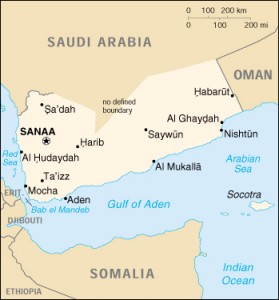A US drone strike on Wednesday in Yemen’s southeastern Shabwa province killed nine people, described by anonymous tribal and Yemeni government sources as ‘al-Qaeda militants.’
 “A US drone struck a house where al-Qaeda militants were meeting, and a car nearby,” in the town of Azzan, a tribal source told AFP. The strike comes after militants reportedly fled to Azzan in retreat of Yemeni government offensive aiming to recapture the towns of Jaar and Zinjibar from al-Qaeda-affiliated militants.
“A US drone struck a house where al-Qaeda militants were meeting, and a car nearby,” in the town of Azzan, a tribal source told AFP. The strike comes after militants reportedly fled to Azzan in retreat of Yemeni government offensive aiming to recapture the towns of Jaar and Zinjibar from al-Qaeda-affiliated militants.
A resident of Azzan said dozens of people “have fled” since the early morning drone strike. “The explosions were very strong … they shook the whole town,” he added.
The fight between the embattled Yemeni state and AQAP militants is being fought largely on behalf of the Obama administration, which has sent in U.S. Special Operations forces in addition to aiding the Yemeni government with money, weapons and training.
The Obama administration has also stepped up its drone war in Yemen with the support of the Hadi government, who is reliably taking orders from Washington just as the former dictator was. President Obama recently approved the CIA’s “signature strikes,” which includes the authority to bomb and kill individuals they can’t identify.
The bloodshed caused by the Obama administration’s offensives in Yemen is probably detrimental to U.S. security. Jeremy Scahill, reporting for Nation, exposed in February after visiting Yemen how U.S. airstrikes that kill civilians and those ill-defined as militants – along with support for the brutal Yemeni government – foments anti-Americanism and fuels international terrorism.
In this sense, the U.S. may be laying the groundwork for blowback in Yemen. Robert Grenier, who headed the CIA’s counter-terrorism center from 2004 to 2006 and was previously a CIA station chief in Pakistan, said recently the drone program is too indiscriminate and may be creating terrorist safe havens, rather than eliminating them.
“We have gone a long way down the road of creating a situation where we are creating more enemies than we are removing from the battlefield. We are already there with regards to Pakistan and Afghanistan,” he said.
“That brings you to a place where young men, who are typically armed, are in the same area and may hold these militants in a certain form of high regard. If you strike them indiscriminately you are running the risk of creating a terrific amount of popular anger. They have tribes and clans and large families. Now all of a sudden you have a big problem … I am very concerned about the creation of a larger terrorist safe haven in Yemen,” Grenier said.





By brutal imperialism we plunder a forth of all the wealth on earth, then we use drone terrorism to squelch the blowback. Such corruption on a national scale, to duplicate this on an individual bases a homicidal maniac would have to blow up a high school and then drone assassinate all the police in town.